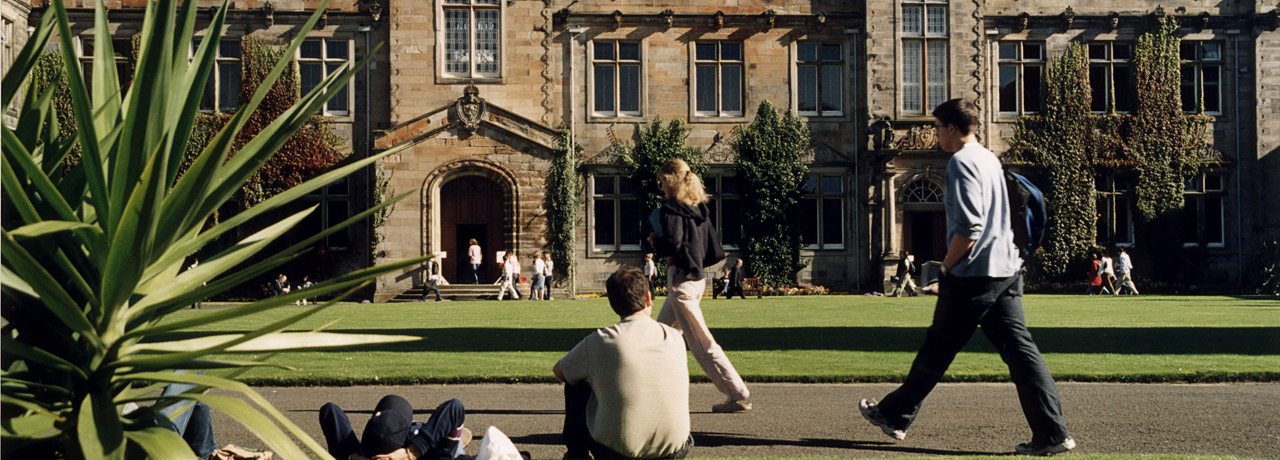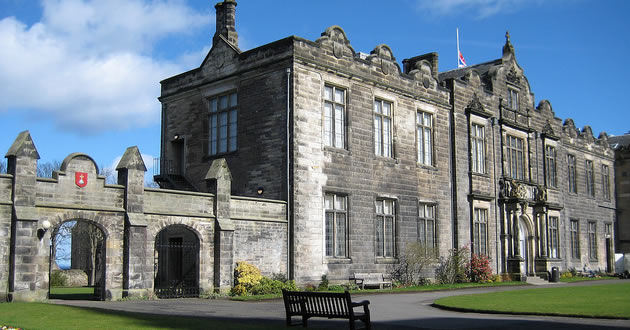Founded in the fifteenth century, St Andrews is Scotland's first university and the third oldest in the English speaking world.
Teaching began in the community of St Andrews in 1410 and the University was formally constituted by the issue of Papal Bull in 1413.
The University is now one of Europe's most research intensive seats of learning - over a quarter of its turnover comes from research grants and contracts. It is one of the top rated universities in Europe for research, teaching quality and student satisfaction and is consistently ranked among the UK's top five in leading independent league tables produced by The Times, The Guardian and the Sunday Times.
According to the Sunday Times, St Andrews is "now firmly established as the leading multi-faculty alternative to Oxford and Cambridge."
Its international reputation for delivering high quality teaching and research and student satisfaction make it one of the most sought after destinations for prospective students from the UK, Europe and overseas. It is Scotland's most cosmopolitan university – a third of the student body of 7,200 is from overseas.
It has a staff of 1,800 and maintains one of the strongest records in the UK for teaching quality, good degrees and student support. In the four years it has entered the UK National Student Survey, St Andrews has ranked as the top mainstream university for student satisfaction.
In 2009 the University received on average 11 applications per place. St Andrews has not entered clearing for several years and sets highly challenging asking rates to attract only the most academically potent students in the Arts, Sciences, Medicine and Divinity.
The University provides an invigorating intellectual climate in which staff have close contacts with one another and with colleagues in other UK and overseas universities and research establishments. All Schools in both the sciences and the arts are actively involved in pushing back the frontiers of knowledge.
Physically the University is closely integrated with the town; the modern purpose-built library and many academic Schools are located centrally. The growth in physical and mathematical sciences has been accommodated at the North Haugh on the edge of St Andrews. A modern sports centre with adjacent playing fields and halls of residence are also located in this area.
St Andrews is relatively small, despite being a "city", with a basic population approaching 17,000. The University population (staff and students) numbers nearly 9,000. On average one in three people you see in the street have something to do with the University. You start to feel very quickly that you belong.
What makes the University of St Andrews special?
· Consistently high teaching quality within a strong research environment.
· Excellent retention rates.
· Diverse forms of teaching: web support and small group interaction.
· Flexible modular degree structure.
· Strong commitment to University-managed accommodation.
· Compact and friendly.
· A Scottish university with a cosmopolitan atmosphere.
· High reputation for an excellent student experience.
Faculties and Deans
The University is divided into four Faculties
1. Arts
2. Divinity
3. Medicine
4. Science
representing all permanent members of academic staff in each School. Each Faculty is led by a Dean. All Deans are now appointed by the University Court on the recommendation of the Principal. They report directly to the Master. In addition there is a Provost, who has responsibility for the development of Graduate Studies across the University as a whole. The Provost is also appointed by the University Court on the recommendation of the Principal and reports directly to the Master.
Deans appoint other Faculty Officers and Pro-Deans and convene Faculty Business Committees. The Faculties, comprising all their permanent staff, have one formal meeting annually. Faculty meetings review matters that have arisen during the year and provide a vehicle for communication across the academic community and advice for the Deans and Pro-Deans.
The Faculty Business Committee's recommendations are considered throughout the year by the Teaching, Learning and Assessment (TLA) Committee, a standing committee reporting to Senate and Academic Council. In 2007, the University revived the Provostship as effectively Dean of Graduate Studies with a remit for the structural and strategic development of the postgraduate community.
Schools
The University is comprised of 18 academic Schools, each headed by a research-active senior member of the academic staff of the School. Heads of School are appointed by the University Court on the recommendation of the Principal, and the duration of the appointments has varied. All Heads of School report directly to the Master.
Heads of School are normally members of both Senate and Academic Council, ensuring ongoing input to the development and implementation of the University's Academic Strategy.
Faculty of Arts
Art History
Classics
Economics
English
Film Studies
History
International Relations
Management
Modern Languages
Philosophy
Faculty of Divinity
Faculty of Medicine
Faculty of Science
Biology
Chemistry
Computer Science
Geography & Geosciences
Mathematics
Physics & Astronomy
Psychology & Neuroscience
IELTS
|
Faculty of Arts |
7.0 with 6.0 in each band |
|
Faculty of Science |
6.5 with 6.0 in each band |
|
4-week Pre-sessional Course |
6.5 with 6.0 in each band |
International Undergraduate Scholarship
These entrant scholarships are for international students who will be studying at St Andrews for an undergraduate degree starting in 2014. The scholarships will be awarded as a tuition fee reduction of up to £4,000 per year for each year of the student's undergraduate studies and will be awarded on the basis of financial need.
Please contact university for details.


2014 © a2fairs. All Rights Reserved. powered by twopulse.com